This review is for a prototype version of the Superpedestrian Copenhagen Wheel, a newer more updated version has been demoed and reviewed here. The updated version does not have a locking side door or removable battery, it has a magnetic charging port, on/off switch and LED charge level indicator along with an updated app.
Superpedestrian was formed by students and faculty from the Massachusetts Institute of Technology (MIT) who had been working to identify and solve sustainability related problems before braking away to commercialize. In 2009 a predecessor to this unique drive system was presented at the Kyoto Protocol climate change conference in Copenhagen. It was sponsored by then Lord Mayor Ritt Bjerregaard and received half a million dollars to continue research. In addition to this grant, Superpedestrin has received funding rounds from Spark Capital (known for funding Foursquare, Twitter, Oculus Rift, Skillshare and others) and others. A lot of the innovation seen with the FlyKly and Zehus ebike wheels originated with the Copenhagen Wheel project and I’m told that some members of these companies are actually former MIT students who worked on the project but have since gone in their own directions.
What makes this all-in-one electric bike wheel conversion kit so special is the ambition and creativity it has sparked in the industry. It’s an elegant, efficient and powerful motor, battery and wheel system that work together and respond to your smart phone to operate in different modes. It may sound a little complex but the system is actually very intuitive and easy to use. There aren’t any wires to run along the bike frame or extra control boxes and battery racks to add… it’s all in the wheel. You charge it up, turn it on, select a mode in the app (turbo, normal, flat city, eco or workout) and then pedal like normal. The wheel uses speed and torque readings to assist you and record performance. When you it’s time to slow down you can use your standard rim brakes (this version of the Copenhagen Wheel is not disc brake compatible) and pedal backwards to activate a power regeneration mode that turns the motor into power station, adding a bit of juice back into your battery. It’s a neat system that works with single speed or multi speed rear cassettes so you can use it with cruisers, road bikes or cross country mountain bikes without losing your own mechanical advantage.
I was able to test ride a developer kit version of the Copenhagen Wheel and was asked not to photograph the internal parts (though the final version will have a removable battery pack). Inside there’s a 350 watt gearless motor that uses magnets to drive forward. It’s smooth and extremely quiet. The hub is setup in a direct drive configuration which means it doesn’t freewheel so there is a bit of drag when coasting or using the system in off mode (as shown in the video). By using a gearless design the regeneration on this kit feels stronger than that of the FlyKly and generates more power thanks to the larger magnet configuration for 350 watts vs. 250. It’s able to easily reach a 20mph top speed and climbs pretty well but also weighs a bit more at ~13 pounds vs. ~6.5 pounds.
The battery technology used here is Lithium-ion which is energy dense (light weight) and long lasting for 1,000+ charge cycles if cared for. The ability to remove the pack makes charging convenient and opens up the possibility for extended range using multiple packs! Once the battery is charged (estimated to take ~4 hours), a physical switch activates the Bluetooth wireless technology onboard and makes the motor discoverable to the app. Once they’re connected the bike is ready to go. One concern I had about the battery location on this kit was the possibility of overheating. Given the proximity of the motor, the batteries providing electricity (and also getting charged with regen) and all of this being sealed inside an aluminum shell it seemed like it could cause damage. I was told that there are sensors inside designed to detect and regulate temperature by limiting performance in the event of overheating. Nice! Keep in mind, if the battery is completely full, regeneration won’t work because there’s nowhere to put the extra energy being generated and this would also hurt the batteries.
I’ve already touched on the smart phone app that serves as a mode selector, ride history reference, wheel lock and social tool but it’s worth digging in a bit deeper here. While visiting Superpedestrian I was told that starting out, the team had thought to add environment sensors that could communicate with the app and send data to the cloud. Imagine the possibilities that knowledge of air quality, temperature and route preference could unlock for motivating change at the city, state and national level. More bike paths, stronger regulations for vehicle emissions etc. and that’s a big focus right now in places like Beijing where people are literally dying from air pollution. This is a place where ebikes were formerly banned (August 2002 to January 2006) due to concerns over environmental, safety and city image issues, but now embracing the technology.
I realize this is a bit of an atypical review with more background than stats and experience descriptions but it’s important to understand the setting and trajectory of the Copenhagen Wheel. Sure, it’s not the lightest or stealthiest thing around and it only comes in bright red but it’s ushering in a new kind of transportation that’s affordable, efficient and smart. At ~$800 this thing will transform your existing bike and help you go further and faster for less than almost any other option around. While it’s not exactly available to the public at the time of this writing, the developer kits are slated to ship Q4 2014 and I’m sure the guys at Spark Capital are pushing to get the public version out ASAP as the demand is huge. While I still prefer a Haibike AMT Pro or Easy Motion Neo Jumper for off road use, the Copenhagen Wheel is hard to beat in the city.
Pros:
- Removable battery pack for charging on or off the bike and easier replacement and recycling
- Powerful 350 watt motor provides good torque for starting and climbing hills but runs quiet
- Open software API and developer support for creating your own apps or downloading those made by others
- Mobile app lets you choose a power setting, review ride history and create a profile for social interactions
- Flat City model provides a little assist on flat terrain and automatically kicks in to “flatten” hills conserving battery while providing a consistent ride
- Drive system is available spoked into 26″ and 700c wheel sizes, includes rim and tire
- Gearless motor design is smooth and quiet, provides excellent stopping and regeneration
- The batteries, controller and motor are all contained in the rear hub so you don’t have to run wires around the bike, the hub is also designed to be water resistant for easy cleaning and use on rainy days
- System is basically hands free once turned on (pedal forward to get assistance and pedal back to activate regen)
- Torque sensor activation is smooth, responsive and efficient extending the range of the battery as you pedal along
- Relatively affordable at $800 for the wheel and motor combined, pretty easy to install compared with other kits
- Solid one year warranty provided by Superpedestrian including motor and battery
- App is easy to use when riding if you’ve got a smart phone handlebar mount (swipe up or down to change modes)
Cons:
- A bit heavier at ~13 pounds than the FlyKly or smaller 250 watt conversion kits
- Unique spoke design looks great but requires help from Superpedestrian to replace and still requires trueing to keep wheel straight over time
- Moderate cogging (magnetic drag of direct drive motor) when coasting or in off mode shown in video review
- Only available in bright red, not the stealthiest electric bike design given the size
- Creates a rear-heavy bike with more unsprung weight, may expose motor and battery to more trauma than a centerdrive electric bike
- Brake levers aren’t connected to motor system, if you keep pedaling the motor will fight your brakes (have to stop or pedal backwards)
- When battery is fully charged, regenerative braking won’t work (motor will stop powering the bike but won’t slow you down)
- Not compatible with disc brakes, must use rim brakes or rely on front brake only with rear backwards pedaling regen mode
- No twist throttle option, pedal assist only
Resources:
- Official Site: https://www.superpedestrian.com/
- More Pictures: https://goo.gl/photos/cuwKF5WkkU9WwExq6

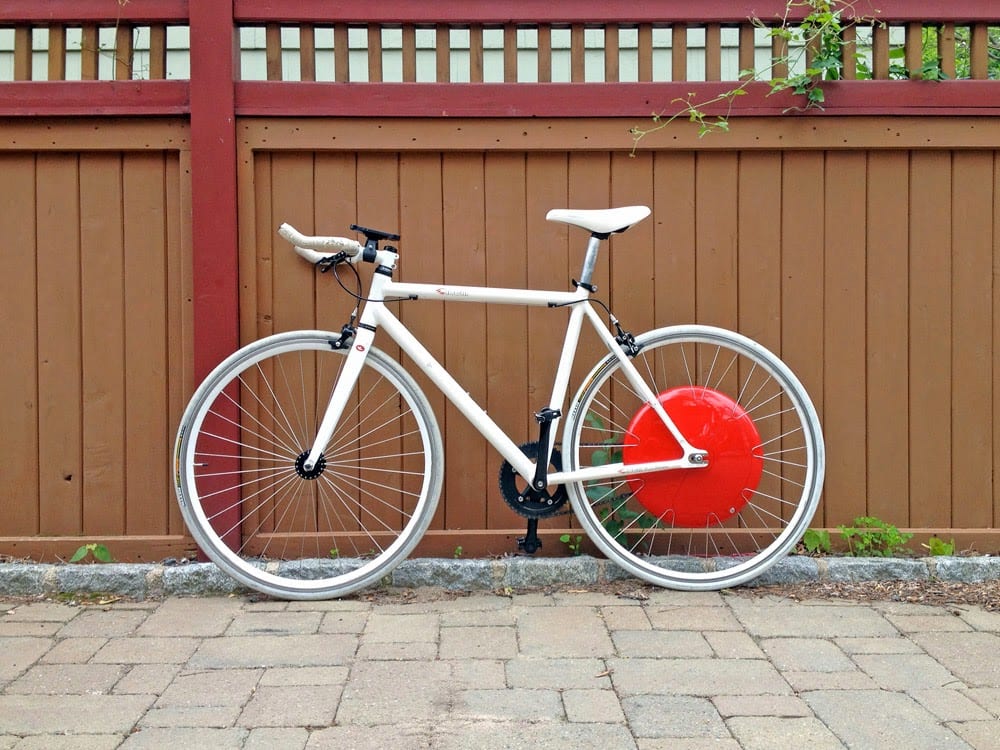
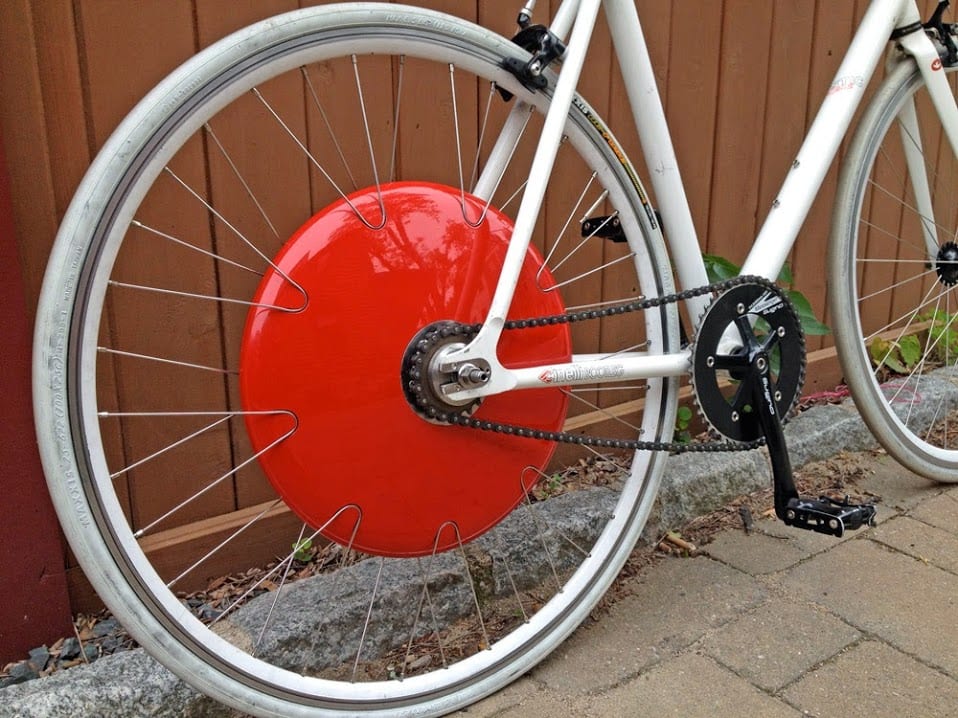
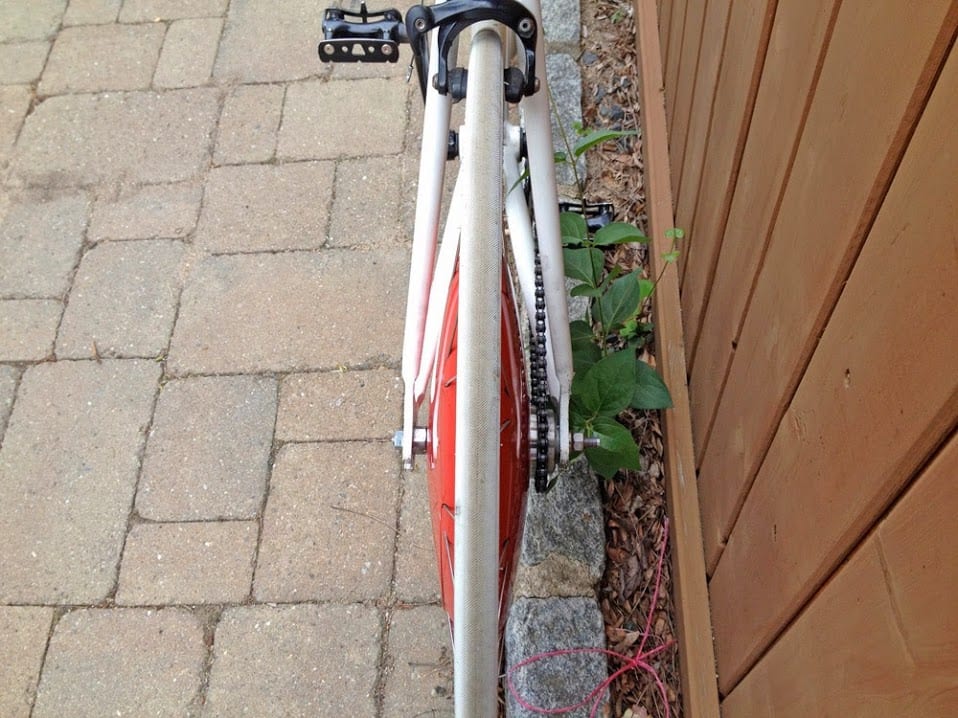
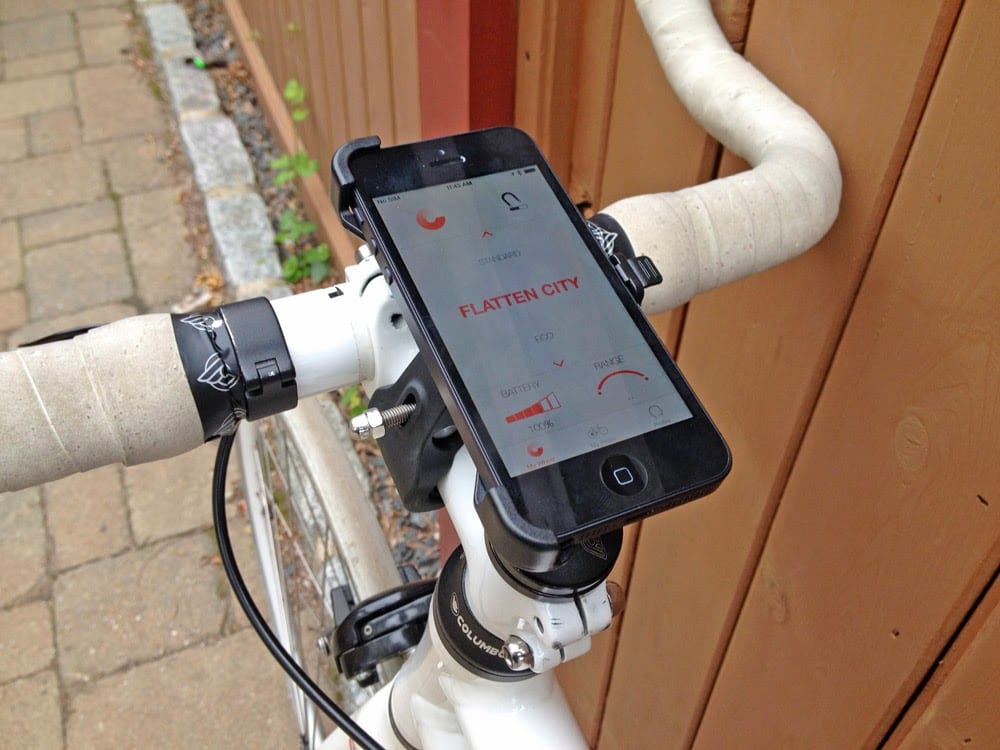
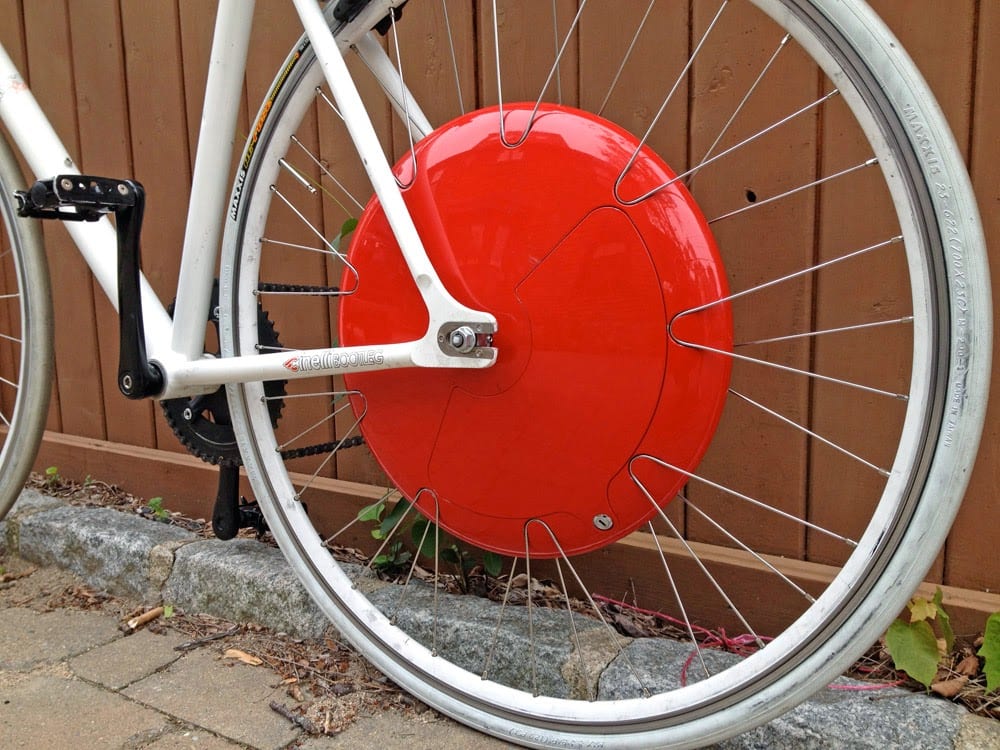
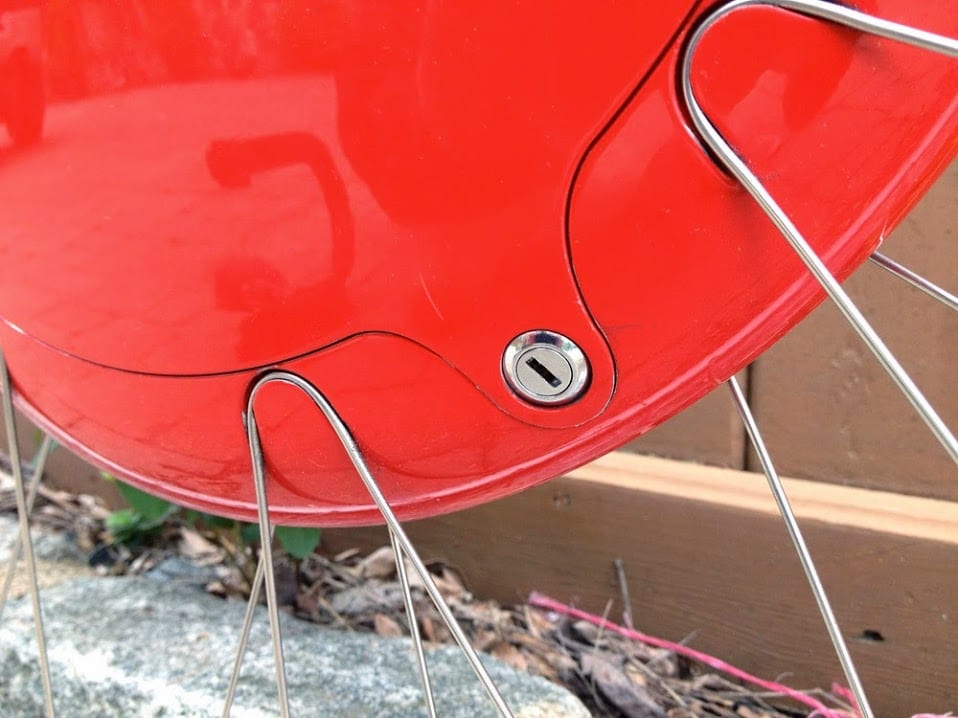
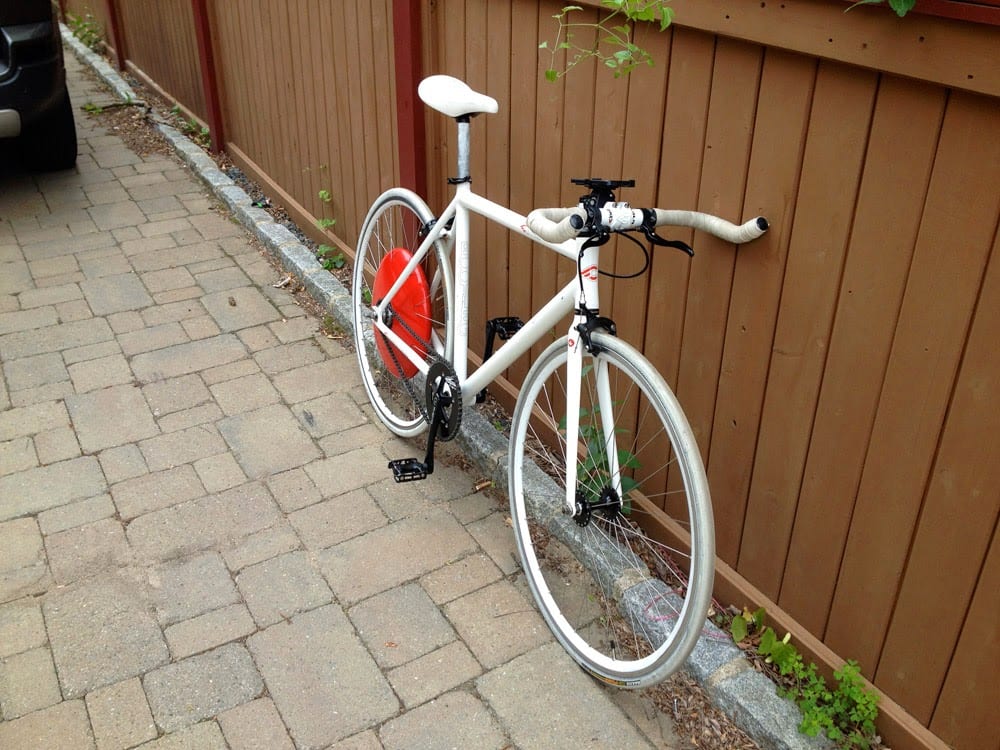
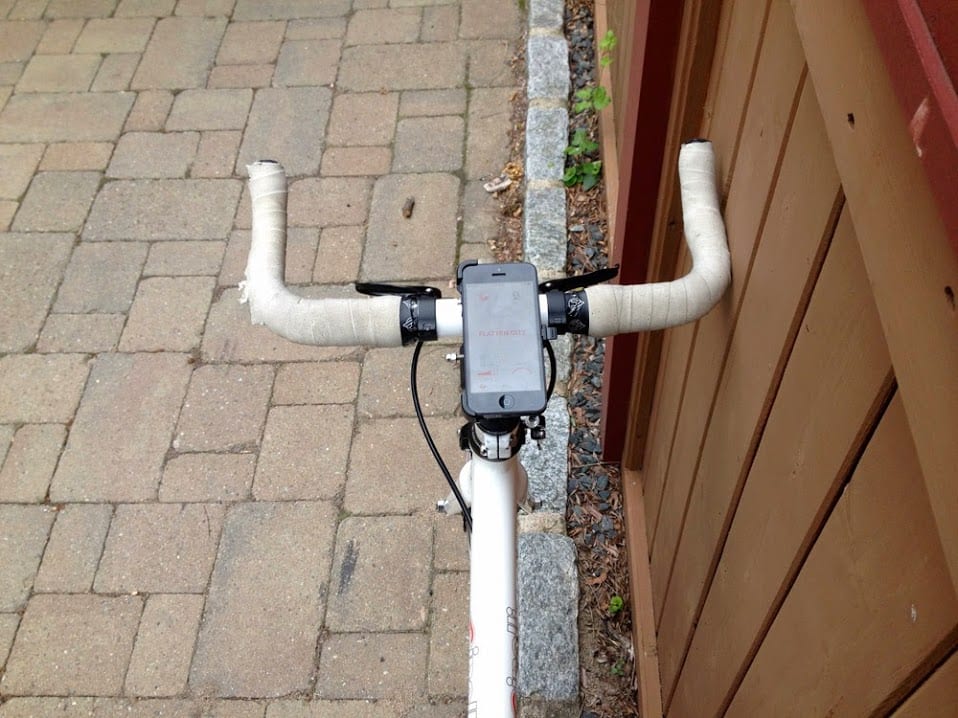



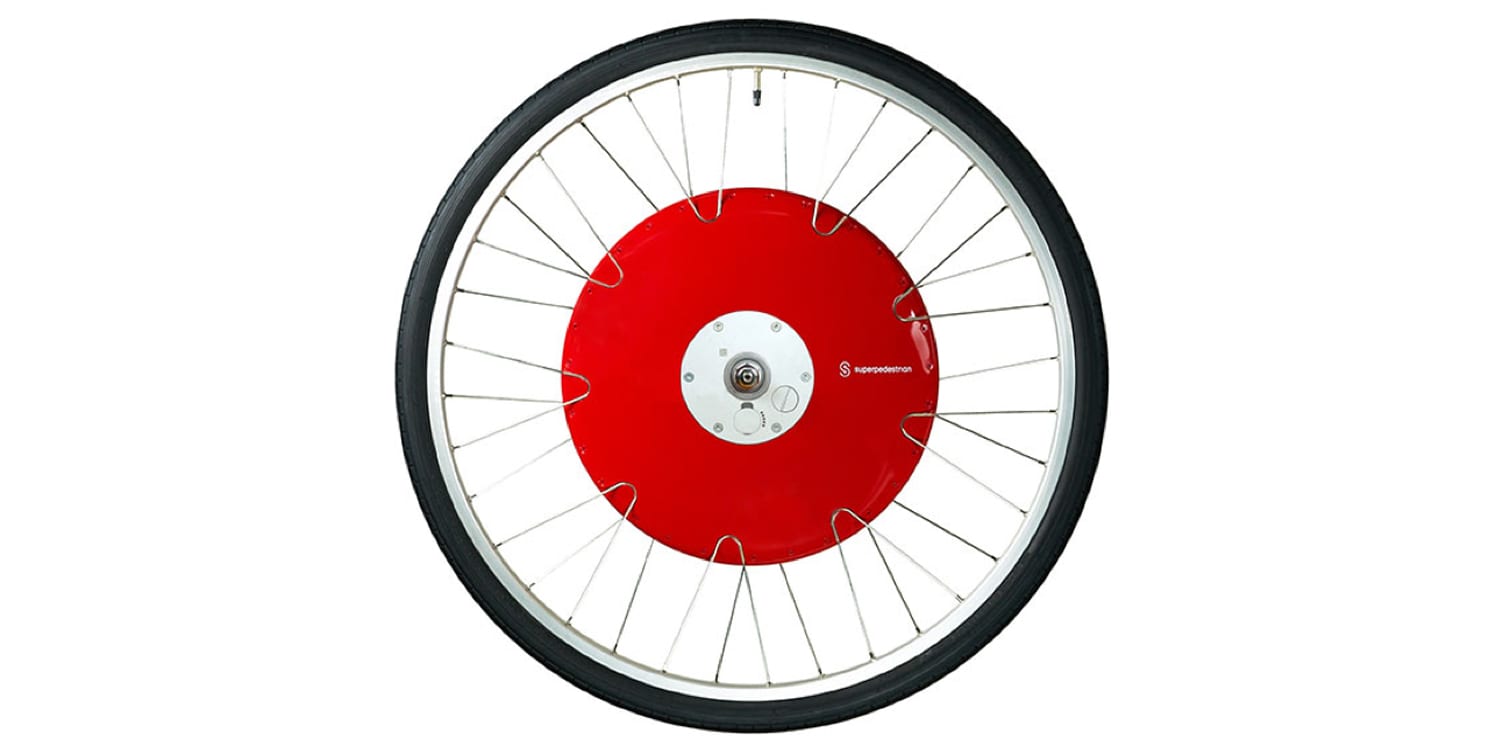
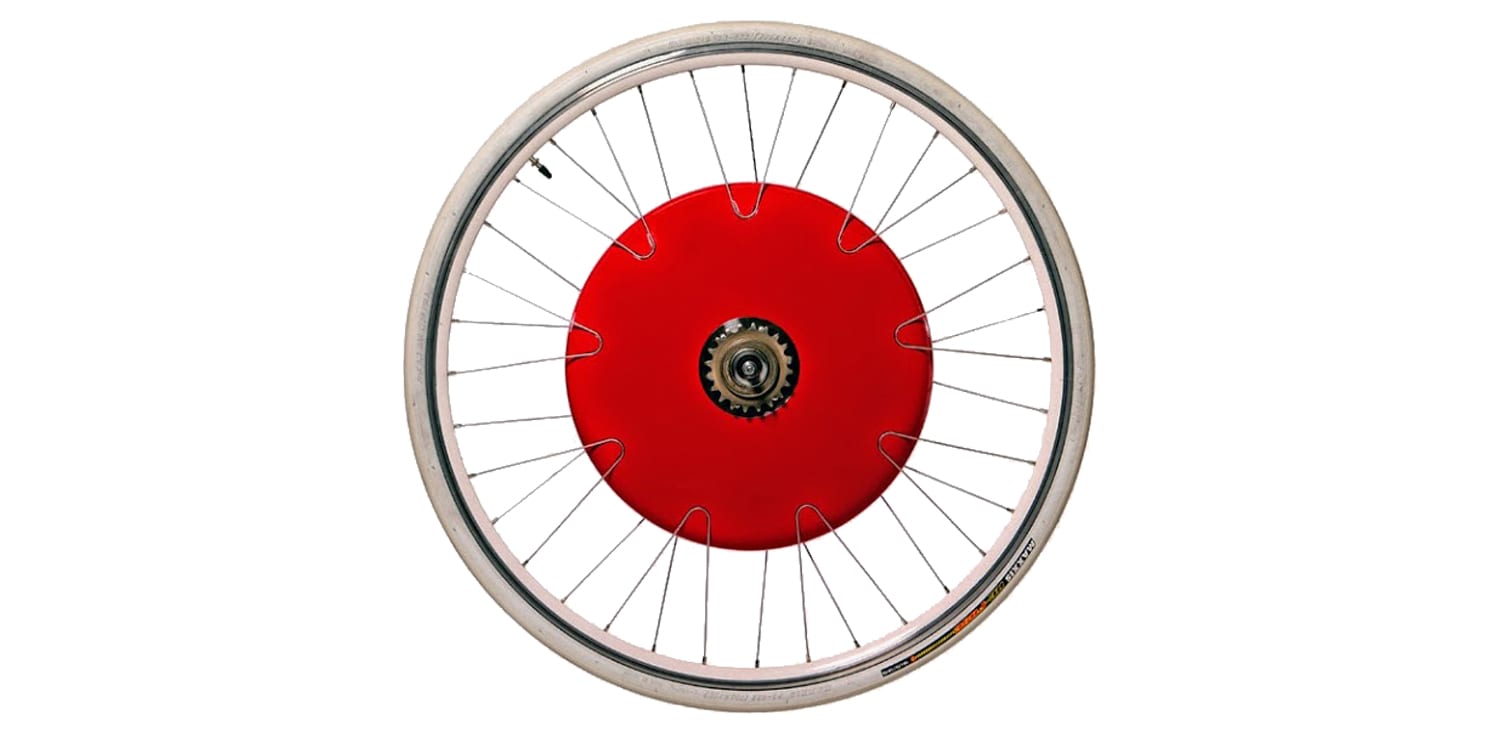


Jason says
Thanks for finally having a review of the Copahegen wheel. But now watching this review and the FlyKly I am confused on which one would be right for me. I like the FlyKly design and price but I am not sure if the Copahegen Wheel would be better or same.
All I want is something that can get me to work with less or no effort at all and climb hills with ease without being sweaty and nasty when arriving to destination (work). Do you have any suggestions for me. I would appreciate it. Thanks keep up the great work.
Court Rye says
Hi Jason, I enjoyed testing both but believe the FlyKly will be commercially available sooner (unless you pre-ordered the beta-developers kit for the Copenhagen Wheel). I liked the smaller size of the FlyKly and didn’t mind the reduced power but I only weigh ~130 so it might depend on your size and how far you need to go. The Copenhagen wheel has a removable battery which will make charging easier and you could also get a second pack for extended rides.
Kolby says
Do you think the changing of gears on a cassette, particularly if gearing is rough, would put sufficient vibration and jarring drive train to mess up the system? Would you say that the single speed set-up that you had in the vid provided sufficient power for climbing hills, say greater than 10%?
Court Rye says
Hey Kolby, the single speed worked fairly well. The FlyKly (competitor to the CW) is only compatible with one speed so they clearly thought it would be alright… Gears definitely help though and for me that’s one of the big benefits of this system. I don’t think changing gears would cause that much harm to the system considering the bike could be rolling over bumps, cracks, potholes and other jarring terrain. I’m not an engineer but these guys are really putting in a lot of effort to get this thing right and they have big investors. I’m sure it will be designed to hold up :)
barry ozmo says
i am certainly interested in the wheel as a possible down the road replacement for my 200 watt wisper 906. australia recently has gone to 250 watt motors. having gear modes extremely important brisbane has many hills. braking seems a worry. would take some practise to get use to back pedeling as you brake in emergency situations. i think 3 roller style brakes would be min requirement to stop quickly with the extra weight. it would be hard to go back from hydraulic disc for me. i am in love with the concepts though. this would couple very nicely with the new merge bicycle for latest upmarket riding
Nan says
I ride a Specialized Vita 10 speed. It’s a hybrid of sorts. I desperately need electric pedal assist as I am not able to climb even small hills without dismounting the bike and walking. This could be a perfect solution for me, especially if it does indeed work well with my existing SRAM cassette components. To your knowledge, would I need my local bike shop to install the wheel? I have never worked on a bike before. The extent of my expertise is being able to remove the front wheel or tighten the seat post.
Court Rye says
Hi Nan, this is one of the easier kits to install and I do believe your bike shop could handle it and it shouldn’t cost too much. Given the installation requirements of the Copenhagen Wheel (that you need to remove your chain and possibly switch cassettes) I’d say work with a professional shop vs. trying on your own given your limited experience. That said, this kit is not currently available, they are only taking pre-orders with a tentative shipping date of “end of 2014” on a first come first served basis. Here’s more info if you still want to try this kit.
Tom says
What does the term dropout mean? How is it measured?
Court Rye says
Hi Tom, dropouts or hangars are the metal slots where a wheel axle slides onto a bicycle frame. Some dropouts are spaced very far apart (that’s the case with most fat-tire bikes) and some are very close and narrow (that’s the case with the front fork dropouts on road bikes). Here are more precise definitions from Wikipedia, you can measure how wide droputs are spaced apart from each other and how thick of an axle they can accommodate like a 15 mm thru-axle or a standard skewer that’s a lot thinner.
Martin Turner says
Does the CW come with a hub gear set if requested on order? I have an option to fit either to single speed or 8 speed nexium hub cassette system… Intuitively a single speed with electric boost choosing when to put in power sounds correct, but then others have stressed the need for gears in hilly areas….. What do you think?
Court Rye says
Hi Martin! I’m not sure I completely understand your question. To my knowledge you can get this as a single speed or with a cassette but I have not heard about an internally geared option. In fact, the only ebike I’ve seen with internal gearing inside of a hub motor is the BionX powered Smart ebike. I personally would go with the cassette because I live near hills… If you’re looking for simplicity, light weight and reduced wear and noise then a single speed could be perfect.
Ryan says
I ordered one of these about a year ago and now that they are saying that they are not going to be out till “spring” of next year. I am thinking about getting one of the high performance E-BikeKits instead. I am an avid cyclist and ride to work every day. the only reason I am looking at getting one of these is to go even faster in the commute. I can get up to 20 mph already with my bike, I just want to get there faster. Would getting this copenhagen wheel be worth it? or would you rather have the 500w e-bikekit that will assist up to 28mph? I’m worried that, where this cuts out at 20 mph, it might not be that helpful.
Court Rye says
Hey Ryan, sorry to hear about the long delay on the CW… That’s a real bummer. I’m not sure about the speed cutoff on E-BikeKit kits but I thought it was more like 20 mph (for legal reasons). If you do get a faster kit and it uses a throttle, you might be putting yourself at legal risk. In my experience, 20 mph is still fast enough because it will keep you at a higher speed for the entire ride vs. just parts when you’re pedaling unassisted. Alternatively, you can shell out for a speed pedelec that will go 28 mph more legally using pedal assist mode. Here’s a full list of speed pedelecs I’ve reviewed.
wjm2222 says
Ryan, I just want to point out that drag is a major factor against going faster than 20 mph. Drag is 2.7 times greater at 28 vs. 20. A human on a bike is not very aerodynamic (.9 Cd), so this probably dominates energy consumption. I think you could expect that the range of the battery would be reduced by about that ratio, that is, the range at 28 might be 10 miles vs. 25 miles at 20.
Court Rye says
Excellent feedback! You are completely right about increased drag at higher speeds and the less than aerodynamic shape of a typical bicycle rider. Thank you for adding this :)
Alex says
I think the point the OP is trying to make is that, unassisted on a regular non electric road bike, one can easily cruise at and exceed the 20mph top speed. I think he is wondering if the 20mph limit given on the nameplates of many of the e-bikes being sold today is a hard limit?. The concern is that the motor will continuously “cut in and out” at 20mph potentially “bouncing” off the 20mph speed. What I would like is a motor that will offer a certain amount of power regardless of the speed i am going so that combined with my own legs I can go faster than 20mph. So for instance I am cycling at full effort and the motor is working at full effort allowing me to go 30mph when an “ordinary” person at a similar effort level might only go 20mph. Does this make sense?
Court Rye says
That makes sense, some ebikes do indeed bounce around 20 mph but most cut out smoothly around that point. Some models like the NEO and EVO models from Easy Motion tend to go a bit above 20 and they also offer a speed pedelec line called NITRO that will do exactly what you want and simply not cut out based on speed (I believe it will stop adding to your speed naturally at higher RPMs but it won’t slow you down). Some bikes like those 2013 models from Polaris and the new Zehus BIKE+ actually slow you down past 20 mph and use the extra energy to help charge the battery. In short, if you want that higher pedaling speed then anything from the Speed Pedelec category here will be perfect and you might also like the Easy Motion NEO and EVO models.
Roy says
I have considerable experience with electronic as a manufacturer at one time and also as a user of many devices in outdoor environments. I haven’t been a cyclist for many years but I’m once more looking to bikes as my age advances (I’m > 60). Whenever I see the words “water resistant” or similar, my alarm bell begins to ring. Electronics, particularly high-density integrated digital circuitry, do not like ANY water and if subjected to it usually fail permanently – either intermittently, buggily or permanently. I’ve seen this quite a bit in the area of camera electronics where manufacturers regularly give similar advertising statements but refuse to honour warrantiesfor water damage on the grounds of “exceeding limits” or some similar evasion. Bike wheels are going to get VERY wet, frequently. I’m skeptical about the longevity of a device like this.
Court Rye says
Hi Roy, thanks for your input! I wasn’t allowed to look inside of the Copenhagen Wheel but I know there are batteries, electronics and the motor in there and even just the road vibration is going to present some increased potential for damage over time. Depending on how and where you ride, the system may be more vulnerable. Even the LCD displays mounted to the bars on many ebikes present an area of risk in heavy rain. I’ve ridden in rain without issue on several ebikes but never an all in one wheel like this. Hard to say… if it rains a lot where you live or you like splashing through puddles then proceed with caution :)
Roy says
Well, I live in northern Europe but it rains everywhere, at least some of the time. There’s not much challenge to waterproofing electronic devices providing you have static case components that can be equipped with gaskets – like battery access hatches. You can make user interfaces watertight if you use membrane switches etc. But once you introduce moving, rotating, components the challenge becomes much greater and much more expensive. It’s the questionable validity of the warranties that make me so sceptical. Again, “water-resistant” when applied to devices likely to be used in all weather conditions are weasel words which are intended to provide an escape clause for manufacturers.
Tom says
Great review! Did you have a chance to try this out on any modestly steep hills? I’ve tried both the 350W and 500W BionX hub systems and 350W doesn’t feel like much on the hills of San Francisco.
Court Rye says
Hi Tom! Unfortunately there weren’t any nearby when I was testing this in Cambridge Massachusetts. I agree that for really steep hills a gearless hub motor (likely what the Copenhagen Wheel is) doesn’t feel that powerful. These days, I’d go with a Bosch or Impulse mid-drive if I was based near a lot of climbs :)
Mark says
I wonder if someone would be kind enough to supply the promotion discount code.
joe says
This review is about a year old, and implies the Copenhagen Wheel will be for sale. It’s Spring 2015 and the Copenhagen wheel has yet to be delivered to a single retail customer. The price has jumped to $949. The battery pack is NOT swappable, and won’t be for the foreseeable future; this according to the people at Superpedestrian. Where is the fact finding, due diligence, scrutiny? What is the actual range and top speed? Guess those details are for the hapless customer to discover?
Court Rye says
Great points Joe, thanks for adding those updates and details to the review through your comment. I do include a date when I publish here to help guide and provide context. I’ve also been more careful about reviewing crowd-funded or prototype ebikes in recent years. I’m not perfect and this review is clearly outdated but I hope it still helps people who might be curious about the historical context and original trajectory of the product.
Max says
Hey just wondering where I can buy that bike, not so much interested in the wheel.. I see on the website its Cinelli but does anyone know which model and where I might be able to buy the white one?
Duende says
Hi Court, Thanks for all the reviews! It helps tremendously. From the comments I am going to wait till both “all in ones” are alpha. My questions are one, does the Copenhagen and the Flykye both regenerate on downhills without peddling backwards? I have a lot of steep and long hills between me and town so i would like to get the energy from the downhills. Two on that same note, would you recommend these for a rider who does not really physically tire long distance and is not worried with exertion but increasing the speed on a long commute to town mostly in hills. With American distances combined with our lack of free time I am trying to speed up the time to town and beyond. I also would like to keep things respectfully steath as some of my commute is through a state park. Thanks again!
Court Rye says
Hi Duende! I cannot say for sure on regeneration but I believe that pedaling backwards will get you the most energy while simply coasting will get a very tiny amount (due to cogging). I realize backpedaling could be annoying and due to the “all in one” nature of both systems, I don’t think they have brake-lever actuated regen. If you’re looking for speed, I’d actually recommend a speed-pedelec which can hit ~28 mph vs. just 20 mph. You sound like a fit and active rider, there are some amazing bikes out there which are light weight, stiff and very performance oriented for people who just want to extend their range and get there fast. The Specialized Turbo and Stromer ST2 both come to mind but I also like the drop bar setup on the Haibike Race and the full suspension of the Thron Impulse Speed.
Duende says
Thanks. Those both look great.
Richard says
Please stop assuming that just because its a direct drive motor that it must not freewheel. My magic pie 4 freewheels the exact same distance as an identical bike without any motor. Very frustrating to see all these warnings of cogging that apparently “must be there” if it’s DD. My 63lb bike with DD coasts and freewheels for what seems like forever.
Court Rye says
Hi Richard, I’ve reviewed the Magic Pie 3 and it also had some cogging which I demonstrated in the video review. I realize this action doesn’t have a big impact on range or ride experience but share it consistently to be thorough about the trade offs between motor types.
Jon says
Hi Court, are you in touch with the guys behind the Copenhagen Wheel? Their video from last year promised a release in “spring of 2015” … which has come and gone. Do you have any insight into what the delays are? The model you rode/reviewed seemed pretty solid and near complete — did they tell you what they’re still working on?
Court Rye says
Hi Jon, I haven’t spoken with the Superpedestrian folks since the day I shot this review and even then, they were kind of disengaged. They wouldn’t let me take pictures or video of certain parts and they didn’t want to promise anything about release dates. I wish I could give you more information but I just don’t know, I’m so sorry for the delays… I know that can be frustrating :/
Ryan says
I’ve since requested a refund from my preorder back in 2013. This is clearly a company that doesn’t care about delivering. Numerous broken promises and plenty of alternatives on the market now.
Benjamin Nead says
I’ve been following news of the Copenhagen Wheel (CW) with great interest since it’s big media splash of December 2013. The original promised shipping date announced then was for the following spring. Since then, it’s been like viewing water at the edge of a mirage: as soon as a promised shipping date would come close, the company would issue yet another memo on their Facebook page stating another delay. This continued throughout 2014.
It really felt like they were finally going to start shipping by the end of 2014 when, suddenly (I believe the exact date was December 15,) they put a video up on YouTube via a Facebook announcement, showing – among other things- a quick photo montage of how the late pre-production examples had become thinner and lighter in weight. Then, at the end of the video, announcement of a delay with shipments now going out to “by the end of spring” of 2015. Facebook comments became more terse but most seemed resighned to hang in with the delay, if it actually meant that the product was really going to be impoved as announced.
Spring came and went rather quietly. The video seemed to passify most and bought CW what most assumed was valuable time. But, by early summer, you could tell the mood of the Facebook inquirers were getting less accommodating. The occasional replies back from CW also grew more vague and less frequent, if such a thing were possible. More disturbingly, though, the more pointed delay criticisms were often no longer being answered and were actually being deleted days later.
It’s now mid August of 2015 and the CW brand has probably suffered irreversible damage by now. I have no verification but it appears that refunds (and early investors were now beginning to ask more frequently on Facebook throughout the summer) were also being delayed and increasingly harder to come by.
It would be very interesting to hear from others who have actually gotten to test ride bikes recently at CW’s Cambridge headquarters or – better yet – been able visit the Detroit manufacting facilty mentioned in the December 2014 CW video. One hopes this story isn’t going to have a sad ending, but there’s little evidence as of today that we’re going to see anything else. If it goes on much longer the lawyers will start moving in. Sad times for all.
rsilvers says
I visited them today. Here is what I learned… They expect to sell their first wheel very soon. One employee said “any day.” I saw eight employees in the front room, and presumably others in back, so they are actively working on it. Production is near Detroit.
The 250 and 350 watt version are identical hardware. The battery is 268 watt-hours and cannot be removed for charging. The demo ride was in “turbo” mode. It was enjoyable with what seemed like instant response. Power cut off at 30 kph (~18.5 mph), which seemed fast enough. I can’t picture wanting to pedal once the power cuts off, as I instantly got spoiled by the assist. I also can’t see using less than turbo mode ever, unless you had to, as it was quick but no one would say it was too quick.
The torque sensor/response felt more natural than the Stromer I recently rode. Since I would always want to use Turbo mode, I would like to know the range at 30 kph in Turbo on typical terrain with a 150 lb rider. Rather than go by their numbers, I will use the motor simulator and plug in the closest values: http://www.ebikes.ca/tools/simulator.html
Using BionX 350 watt motor, 48v 5.6Ah battery, 85 kg mass, 0% grade, 72% throttle: 30 kph speed and 22 km / 13.7 mile range on level ground with no wind and no human input. More range one you factor in you pedaling. I liked it a lot overall.
Court Rye says
Great update! Thanks for sharing what you discovered on your visit :)